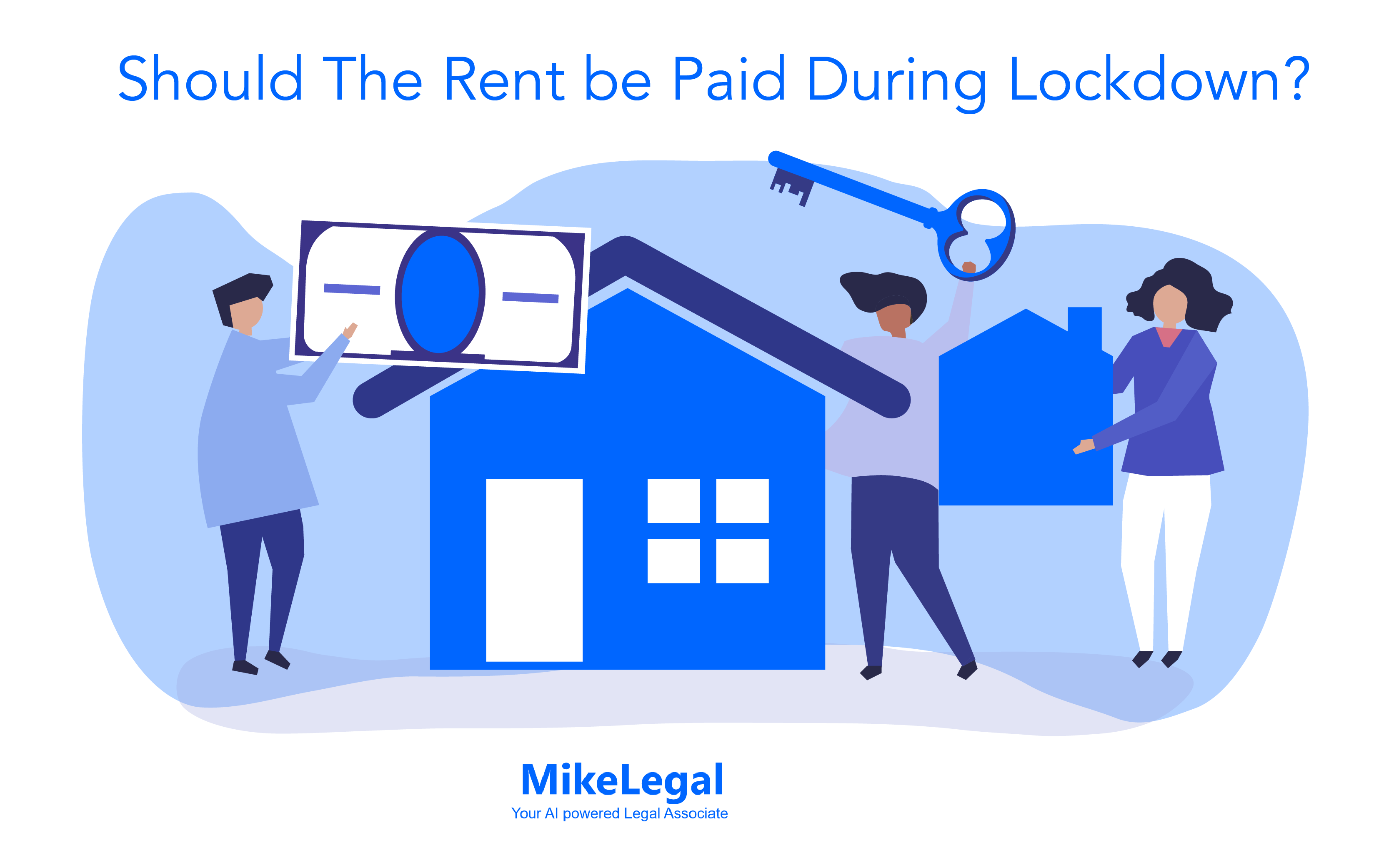Should The Rent be Paid During Lockdown?
During this COVID-19 people are not just worried in the sense of catching this virus but also about paying existing rents and EMIs. Since 23rd March 2020, the whole of India is under Lockdown with no movements for non-essential activities and businesses are closed. People relying on their daily cash flow broke their back and burnt their savings to run their houses during this time. For those who were having a rented space (residential or commercial), were even though obligated did not have the capacity to pay the rents.
Owing to this, an Urgent Application was brought before the Delhi High Court[1], to exempt the rent for the times of pandemic. The issue of suspension of payment of rent was brought before the court with the defense of ‘Force Majeure‘ conditions arising due to pandemic outburst.
Facts
A store in ‘Khan Market’ had a lease agreement of INR 300 per month since 1975, the Senior Civil Judge-cum-Rent Controller granted a decree of eviction in respect of the shop in Khan Market. The Revision Petition was filed in the court which lead to the order of payment of INR 3.5 lakh per month. The present petition was filed because in the revision order of Delhi High Court, it stated that any default on the payment would lead to the eviction order. The basis of the petition is the unseen circumstances which led to disruption in business, “circumstances are force majeure and beyond the control of the Tenants”.
Thus, by this application, it was pleaded in front of the court that he is ready to do a part payment, however, at least one-month rent must be suspended as there was no business at all.
Issue
The application so filed was requesting to suspend the rent during the lockdown. The pandemic has greatly affected the economy, thereby the contractual relationships. The question was, “Whether the lockdown would entitle tenants to claim waiver or exemption from payment of rent or suspension of rent?”
Arguments
The counsel for the petitioner stated that rebate of some amount is important because of the lockdown as there was no sale. On the other hand, the defendant claimed that the petitioner is a rich businessman. INR 3.5 lakhs is a meagre amount for him. Also, the defense force majeure cannot be used in the present case as it deals with the Delhi Rent Control Act, 1958.
Analysis & Findings
Findings of the Court can be divided as per the following topics —
Existence Of A Contract
Only if the contract in between the tenant–landlord or lessor-lessee, would have a clause on force majeure or any other similar clause, only then it would be governed under Section 32[2] of the Indian Contract Act, 1872.
- The court referred to Energy Watchdog v. CERC & Ors.[3], in which the Hon’ble Supreme Court, specified that the contract itself should contain an implied/expressed provision for the waiver; and it would be governed under Section 32 or Section 56 of the Contract Act.
- Section 56 is the Doctrine of Frustration[4], i.e. the ‘impossibility of performance’. The court on reference to various Supreme Court judgments [5], stated that the lease agreements is a “completed conveyance” agreement, i.e. even though one pays the rent on a monthly or yearly basis, it is considered that it has been transferred/delivered under sealed writing. Therefore, there comes no option of waiver/suspension/exemption from payment of rent.
Absence Of A Contract
- If there is no contract between the parties then Section 108 of the Transfer of Property Act, 1882 would apply. The doctrine of Frustration can be referred in this act in Section 108 (B) (e) [6], which under the rights of lessee states that, if the lessee feels that the property is ‘substantially or permanently unfit’, then at his option, the lease can be considered as void.
- Having said that, court after referring to Raja Dhruv judgment [7], pointed out that “temporary non-use” of the property will not be considered under the domain of property being ‘unfit’.
- “Thus, for a lessee to seek protection under sub-section 108(B)(e), there has to be complete destruction of the property, which is permanent in nature due to the force majeure event.” [8]
- Therefore, lockdown leading to temporary non-use would not waiver the rent to be paid.
Suspension Of Rent
- If the suspension is asked on the basis of ‘equitable jurisdiction’, then the facts and circumstances of the case would help to decide the same.
- Lastly, Court stated, that if a contract is based on the ‘profit-sharing arrangement’ then the person can be entitled to suspension; because if there is no sale, then the profit cannot be given. This will be purely determined by the terms of the contract.
Conclusion
The court stated that Section 32 or 56 can be used only in the presence of a contract. That is, only when the contract has explicit or implicit terms of force majeure, the exemption of paying rent can be sought for. A person claiming the suspension should check the terms of the contract before deciding the issue.
The court pointed out that provisions of Transfer of Property Act would be applicable when there is no contract between parties. Thus, clarifying the position of Section 108 (B) (e)- Rights of Lessee, with respect to the Doctrine of Frustration.
It also pointed out that the lease or the rental agreements are ‘executed contracts’ and not ‘executory contracts’. Thus, there is no inherent right of a party to claim the suspension of rent. The exemption can be decided on the basis of facts and circumstances of each case individually.
The court in the present case did not suspend the rent, however, it allowed a delayed payment because of the lockdown. The same was decided after considering the following factors: (a) the nature of the property (Khan Market- area having highest rent in the whole Asia); (b) the financial and social status of the parties;(c) the amount of rent (INR 3.5 lakhs per month in this case which is on the lower side when compared to general rent of that area) and whether that rent is commensurate to the prevalent rate; (d) other factors specific to the case; (e) any contractual provisions in the contract (the Court did not find any); (f) protections under any executive order.
This judgment has come as a relief to all the landlords/lessors in Delhi. It has clarified the confusion of paying rents during the COVID times.
References:
[1] Ramanand & Ors. v. Dr. Girsh Soni & Anr.; RC. REV. 447/2017 https://www.livelaw.in/pdf_upload/pdf_upload-375186.pdf
[2] Section 32. Enforcement of contracts contingent on an event happening. — Contingent contracts to do or not to do anything if an uncertain future event happens cannot be enforced by law unless and until that event has happened. If the event becomes impossible, such contracts become void.”
[3] (2017) 14 SCC 80
[4] “56. Agreement to do impossible act. — An agreement to do an act impossible in itself is void…”
[5] Raja Dhruv Dev Chand v. Raja Harmohinder Singh & Anr., AIR 1968 SC 1024; T. Lakshmipathi and Ors. v. P. Nithyananda Reddy and Ors., (2003) 5 SCC 150
[6] “if by fire, tempest or flood, or violence of an army or of a mob, or other irresistible force, any material part of the property be wholly destroyed or rendered substantially and permanently unfit for the purposes for which it was let, the lease shall, at the option of the lessee, be void…”
[7] Supra note 5.
[8] Supra note 1.
Author credit: Kritika Gandhi






